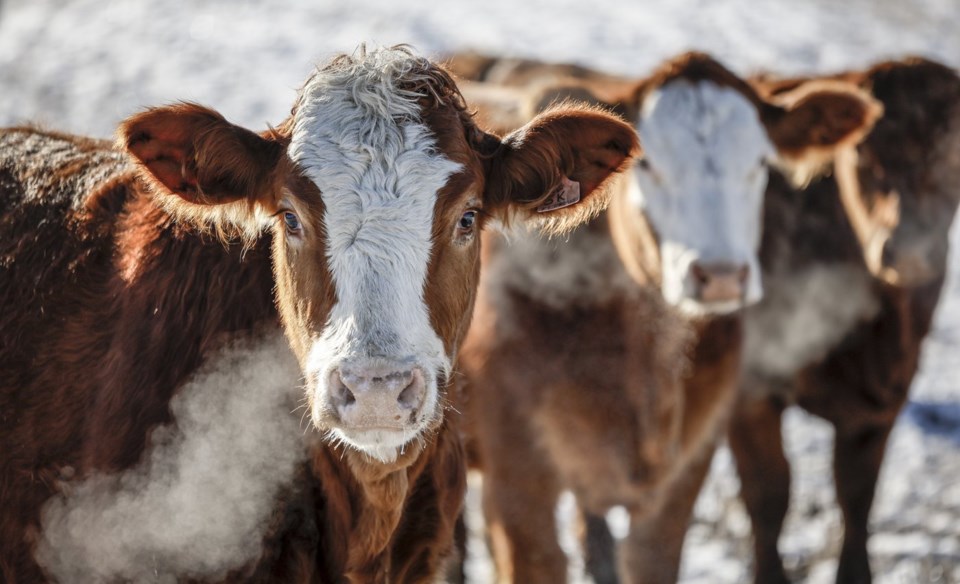EDMONTON — Alberta animal farmers are pleased but anxious for updates after the provincial government paused new limits on annual on-farm slaughter sales.
Under Alberta's on-farm slaughter program, licensed producers can sell cows, pigs, chickens and other animals directly to consumers and avoid going through commercial meat inspection rules.
The program gives farms, especially smaller operations, access to markets they wouldn't otherwise have, while giving consumers a way to buy meat in bulk and directly support local producers.
Alberta launched the program in 2020 and last week introduced new rules limiting annual sales per farm to roughly 2,250 kilograms — or 5,000 pounds — of live animals.
The government's website says that limit could mean roughly four cows, 76 goats or 150 chickens per farm.
For Norwin Willis's family farm near Sexsmith in northern Alberta that would mean a roughly 70 per cent cut to his target slaughter sales this year.
"We were quite shocked, let's put it that way," said Willis, who mainly sells chickens but also some pigs and cows.
"It would take out a huge chunk of what we are currently doing."
Brooke Vanderkley, a farmer near Sylvan Lake, south of Edmonton, is in the same boat. She sells about 600 chickens per year as well as a handful of cows with plans to grow beef operations.
"There's a lot of providers, us included, who have built how we run our business and how we run our farm in accordance with the program as it was currently standing," Vanderkley said.
The limits would have applied to all new on-farm slaughter operations licensed after July 2, while existing operations would operate limit free until they need to renew their licence, which is valid for five years.
On Tuesday, Alberta's Agriculture Ministry published a notice saying it had heard concerns from producers about the "unintended consequences" of the changes and the new rules would be put on ice for more consultation.
Both Vanderkley and Willis said they appreciated the province taking their concerns seriously, but they were unsure about celebrating.
"The word pause makes me a little bit hesitant for what's to come," said Vanderkley.
"It's not a full retraction."
Agriculture Minister R.J. Sigurdson said in a statement Wednesday the intention behind the limit was to protect public health, as it would reduce the amount of uninspected meat circulating in Alberta.
"This change would help to minimize the risk of food-borne illness and outbreaks and maintain Alberta’s reputation as a safe source of high-quality meat," Sigurdson said.
In 2023, nearly 450 people were infected after a substantial E. coli outbreak in Calgary, which was traced back to a commercial kitchen company supplying meat to daycares. Thirty-nine children and an adult were hospitalized.
Officials said the company only used meat purchased from an inspected source and not directly from an on-farm slaughter operation.
RCMP have said the illegal slaughter and sale of uninspected meat has increased in recent years, and in a few cases charges have been laid.
Sue King, a farmer in Crooked Creek, northwest of Edmonton, said she thought the government's proposed limit would just punish farmers following the rules.
"A huge portion of us are following the rules, and with anything there's going to be people that don't," said King, who runs an on-farm slaughter operation while also providing a butcher service to other producers.
"If there are issues specifically to (do with) food safety, if that's what their concern is, they need to address those specific operations."
Vanderkley agreed. She said the government already has rules in place to protect public health, such as prohibiting producers like her from selling meat commercially or from selling more than a certain number of animals to the same person each year.
She suggested the province beef up its inspections of on-farm slaughter operations as a licence condition or make licence holders take a food safety course.
Sigurdson didn't have a firm deadline for when the new round of consultations would be finished but said it would take the time that's needed.
"We are committed to getting this right to ensure the program supports public safety, as well as the sustainability of Alberta’s livestock industry," Sigurdson said.
This report by The Canadian Press was first published July 10, 2025.
Jack Farrell, The Canadian Press



